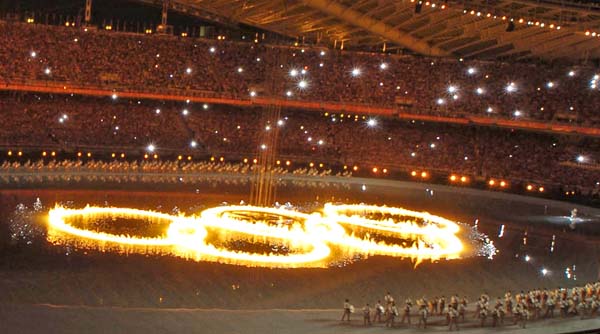
Nagano, Japan, a city of 378,000, spent a whopping $10.5 billion in preparation for the games, thanks in part to the construction of a bullet train to shuttle spectators between Nagano and Tokyo in 90 minutes, about half the typical time. But the bullet train had the unfortunate effect of encouraging tourists to book hotel rooms in Tokyo as opposed to Nagano. This earned the 1998 event the nickname, “The Commuter Olympics” [sources: Payne, The Economist].
As the games neared, the Nagano Organising Committee had to cancel a quarter of the 16,000 Nagano hotel rooms it had reserved due to low demand. Nearby ski villages reported that instead of being at 80 percent occupancy — the normal level — they were at a mere 60 percent occupancy as regular tourists steered clear of slopes presumably crowded with Olympic tourists. In the end, the Olympic Games didn’t bring in the crowds nor did it boost tourism as the city had planned [source: The Economist].
The games ran at a loss but the full cost may never be known. During the bidding process, the Nagano Organising Committee plied International Olympic Committee members with first-class airline tickets, stays at luxurious resorts, and pricey entertainment. Later, a member of the bid committee ordered the records — all 90 volumes of them — to be burned. Nagano representatives insisted about $18 million was spent on the Olympic bid, but critics say the figure was closer to $66 million [source: MacIntyre].
4
2000 Sydney Summer Olympics

Although most Australians knew hosting the 2000 Summer Olympic Games was an expensive proposition, most thought the benefits — namely, a long-term boost in tourism — would outweigh the financial risk. Millions watched the Olympic opening ceremonies, a symbolic fruition of Sydney’s $3.8 billion Olympic preparation outlay. A third of that cost was born by taxpayers [source: CNBC].
However, lagging visitor numbers during the Olympics foreshadowed a different fate. While the games were largely considered successful, the 132,000 tourists expected to stay in Sydney during the 17-day event never materialized. Instead, there were a mere 97,000 visitors. Tourists who weren’t interested in the Olympic Games canceled or delayed their visits for fear of crowds [source: Saunders].
And what about the 8 to 10 million tourists a year who were forecast to visit Sydney following the Olympics? They didn’t show up, either. At least not in the expected droves; instead, a steady 2.5 million visitors have been touring the region, far fewer than the country had once hoped [source: Saunders].

Athens hosted the Summer Olympics a second time more than a century later, but with a much more disastrous financial result. While the official cost was $4.6 billion, the actual price tag may have been as high as $15 billion for specialized athletic complexes that included the Olympic Beach Volleyball Center and Olympic Tennis Center [source: Athens Info Guide, CNBC].
After the last spectators left, many of the venues were never used again. In 2012, a reporter witnessed a smattering of individuals jogging around Athens’ Olympic Sports Complex, dodging windswept debris and a series of rusty locked gates along the way. Many of the complex’s amenities, including its tennis courts were shuttered. Worse, she learned that a restaurant constructed specifically for competitors and dignitaries was in business for a single hour to host the Greek prime minister. New kitchen equipment and chairs in their original packaging lay abandoned inside the building eight years later [source: Smith].
Athens’ Olympic build was funded by the socialist country’s public investment budget, a move that has taxpayers still footing the bill. Some believe paying for the Olympics helped fuel Greece’s economic crisis in 2009 [source: CNBC].
2
2006 Turin Winter Olympics

In the months leading up to the 2006 Winter Olympic Games, the organizing committee in Turin, Italy, struggled with some tough choices. Faced with funds falling $95 million short (at one time the shortfall climbed to as much as $167 million) and threatened with bankruptcy, the organizers of the world’s largest athletic competition started canceling Olympic parties, and cutting travel and promotional budgets. And then they got creative [source: Kahn].
Instead of hosting the Paralympics — a disabled athletic competition traditionally held following the Olympics — Turin sold the rights to a private-public company for about $40 million. Still, the income wasn’t enough. So the Italians launched a lottery game to quickly raise additional funds. This last-ditch effort lessened the gap, but when the games were over Turin was left with about $49 million in debt. Since then, it has attempted to sell some of the specially constructed Olympic competition venues in hopes to eventually break even [source: Kahn].
1
2010 Vancouver Winter Olympics

There were a few hiccups along the way but the 2010 Olympic Winter Games in Vancouver, Canada, seemed worth the trouble. Case in point: Even though the city had to step in with financing after the Olympic Village’s developer ran out of credit, Canadian athletes won a record 14 gold medals, including the Canadian holy grail, the gold in ice hockey.
Unfortunately, just as the afterglow of the Canadian athletes’ performance began to wane, Vancouver was left in a financial pickle.
Vancouver had to grapple with an estimated $1 billion debt, including $730 million incurred by the Olympic Village bailout [source: CNBC]. To recoup some of the cost, the city began marketing the Olympic Village as an environmentally friendly residential neighborhood, hoping to convince buyers to move into the many condos that sat empty. They received only a tepid response.
Sales of luxury condos in the Olympic Village’s 16 buildings (now known as Millennium Water) were so slow that the project went into receivership and the complex was turned over to Ernst and Young, the firm charged with recouping as much of the city’s debt as possible. Even so, the city and its creditors aren’t expected to ever fully recover its Olympic expenses [sources: Austen, CNBC].
